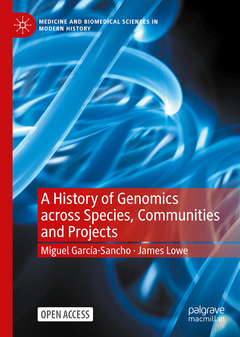A History of Genomics across Species, Communities and Projects, 1st ed. 2023 Medicine and Biomedical Sciences in Modern History Series
Auteurs : García-Sancho Miguel, Lowe James

Exploring the use of genomic tools by biochemists, cell biologists, and medical and agriculturally-oriented geneticists, this book portrays the history of genomics as inseparably entangled with the day-to-day practices and objectives of these communities. The authors also uncover often forgotten actors such as the European Commission, a crucial funder and forger of collaborative networks undertaking genomic projects. In examining historical trajectories across species, communities and projects, the book provides new insights on genomics, its dramatic expansion during the late twentieth-century and its developments in the twenty-first century. Offering the first extensive critical examination of the nature and historicity of reference genomes, this book demonstrates how their affordances and limitations are shaped by the involvement or absence of particular communities in their production.
Miguel García-Sancho is a Senior Lecturer at the University of Edinburgh in the UK. He led the project ‘TRANSGENE: Medical Translation in the History of Modern Genomics’, with funding from the European Research Council.
James Lowe is a Senior Research Fellow at the University of Edinburgh in the UK. He is a historian and philosopher of biology who worked on the European Research Council-funded project ‘TRANSGENE: Medical Translation in the History of Modern Genomics’.
This book is open access, which means that you have free and unlimited access
Examines the history of genomics in a unique way, due to its wide chronological timeframe and multispecies approach
Critically reinterprets the ‘translational gap’ between sequence data and their potential uses
Highlights the significance of scientific communities that were eclipsed by the Human Genome Project
Date de parution : 04-2023
Ouvrage de 380 p.
14.8x21 cm
Disponible chez l'éditeur (délai d'approvisionnement : 15 jours).
Prix indicatif 42,19 €
Ajouter au panierDate de parution : 04-2023
Ouvrage de 380 p.
14.8x21 cm
Disponible chez l'éditeur (délai d'approvisionnement : 15 jours).
Prix indicatif 52,74 €
Ajouter au panier